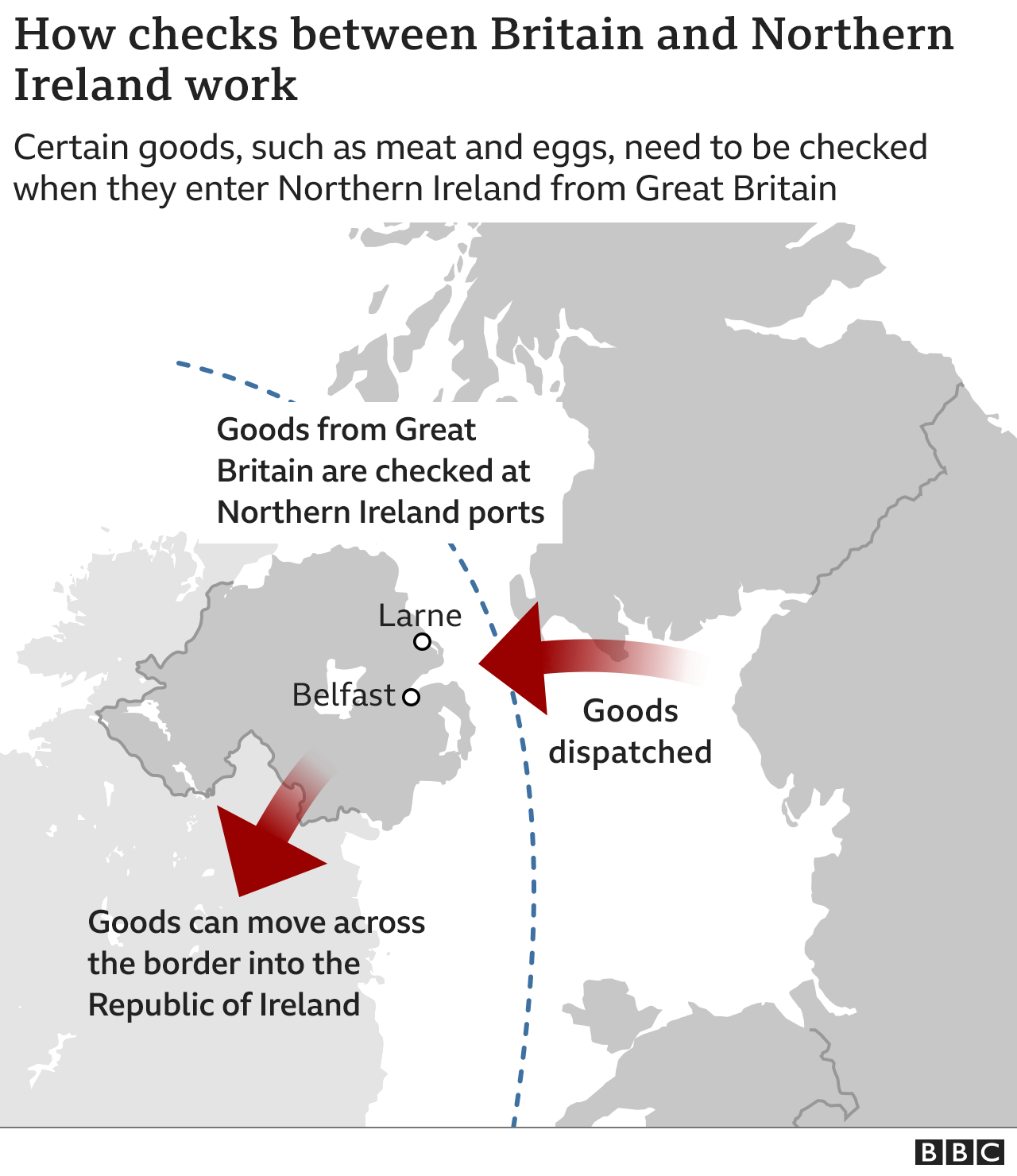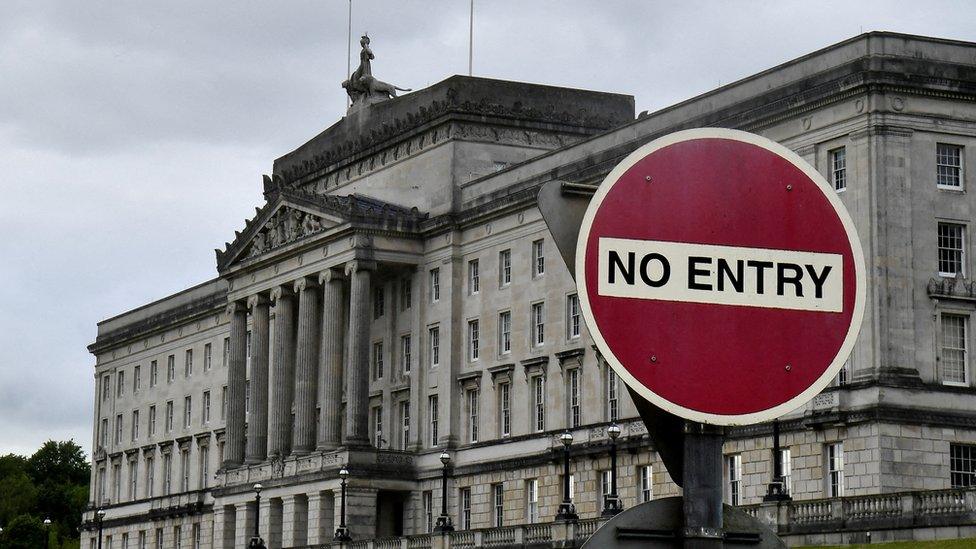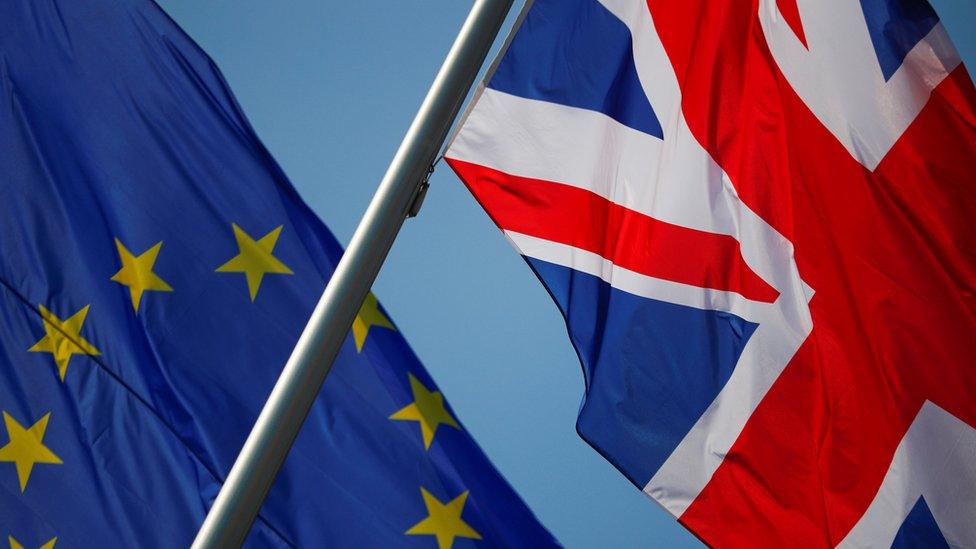Ireland leader Leo Varadkar says he has regrets over NI Protocol
- Published
- comments
Ireland leader has 'regrets' over NI Protocol
Irish Prime Minister Leo Varadkar has said he regrets the protocol being imposed on Northern Ireland without the support of unionists and nationalists.
He told the BBC the measure was working but said he understood why unionists felt it had "weakened the union".
The protocol, which keeps Northern Ireland aligned with some EU trade rules post-Brexit, has been a source of tension since it was enacted in 2021.
Unionist parties argue it undermines Northern Ireland's place within the UK.
Mr Varadkar became Taoiseach, or prime minister of Ireland, for the second time last month.
He previously served in the role between 2017 and 2020, and therefore played a part in the Brexit talks that ultimately led to the creation of the protocol. While the protocol has been in place for more than a year, it remains a point of contention with talks continuing between the UK and EU to find a resolution.
It is an agreement between the EU and UK which allows goods to be transported across the Irish land border without the need for checks.
Before Brexit, it was easy to transport goods across this border because both sides followed the same EU rules but, after the UK left, special trading arrangements were needed so that this could still happen.
The EU has strict food rules and requires border checks when certain goods - such as milk and eggs - arrive from non-EU countries.
The land border is a sensitive issue because of Northern Ireland's troubled political history. It was feared that cameras or border posts - as part of these checks - could lead to instability.
Unionist parties argue that placing an effective border across the Irish Sea undermines Northern Ireland's place within the UK.
In protest against the protocol Paul Givan of the Democratic Unionist Party (DUP) resigned as first minister in February 2022, collapsing the power-sharing agreement. Since then, there has been no devolved government in Northern Ireland.
Under Northern Ireland's power-sharing system of government, introduced in the 1990s as a way of ending decades of violence, Sinn Féin - which became the biggest party in the Northern Ireland Assembly last year - cannot nominate its first minister until the DUP puts forward a nomination for the position of deputy first minister. The DUP is refusing to do under its ongoing protest against Brexit trading arrangements.
Asked by the BBC's economics editor Faisal Islam whether anything could have been done differently during the protocol talks, Mr Varadkar said his main regret was that the measure had been "imposed on Northern Ireland without the support of both communities".
"In the same way Brexit was imposed on Northern Ireland without the support of both communities, the protocol was imposed on Northern Ireland without the support of two communities," he said, laying some blame on the fact Northern Ireland's government "was not functioning".
But Mr Varadkar said the protocol was working economically and that the absence of a hard border between Northern Ireland and the Republic was proof of this.
Speaking at the World Economic Forum in Davos, he also said Northern Ireland's economy was "outperforming the UK economy".
Northern Ireland's economy did appear to be doing better than the UK average on some measures last year.
However, figures from the NI Statistics and Research Agency suggest it entered a technical recession - two consecutive quarters of shrinking economic output - at the end of the summer.
The UK as a whole has so far avoided a technical recession, although UK and NI output figures are not directly comparable.

But Mr Varadkar said he could understand why unionists and unionist politicians felt the protocol had "lessened the links [and] weakened the union between Northern Ireland and Britain" without them "having a proper say as to how it operates".
Mr Varadkar's interview came amid an ongoing stalemate at Stormont, the Northern Ireland parliament.
There has been no functioning devolved government at Stormont since February 2022 after the Democratic Unionist Party (DUP) withdrew from the institution in protest against the Protocol.
The party has continued its boycott at Stormont and is demanding fundamental change to the protocol before it considers a return to the assembly.
Mr Varadkar said he hoped a fresh agreement between the EU and UK could be reached "sooner rather than later", describing UK Prime Minister Rishi Sunak as someone he believed would "go about doing business and getting things done".
"The possibility of an agreement... in the next couple of months is very real and, with reasonableness and flexibility on both sides, it can be achieved," he added.
Responding to his comments, DUP leader Sir Jeffrey Donaldson said: "The Northern Ireland Protocol has never had the support of unionists and never will enjoy unionist support. It was imposed against the will of unionists.
"Whilst the Taoiseach's comments are welcome, rather than focus on the past, London, Dublin and Brussels must now redouble their efforts on replacing the protocol with arrangements that unionists can support."
- Published2 February 2024

- Published19 January 2023

- Published15 January 2023
